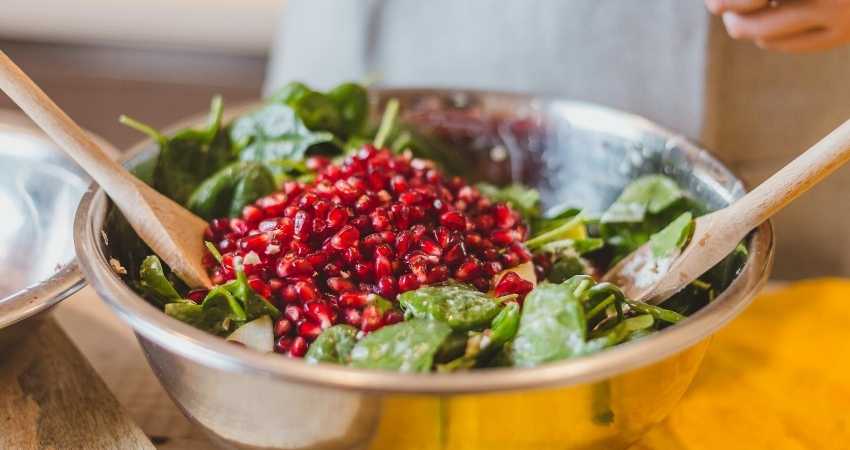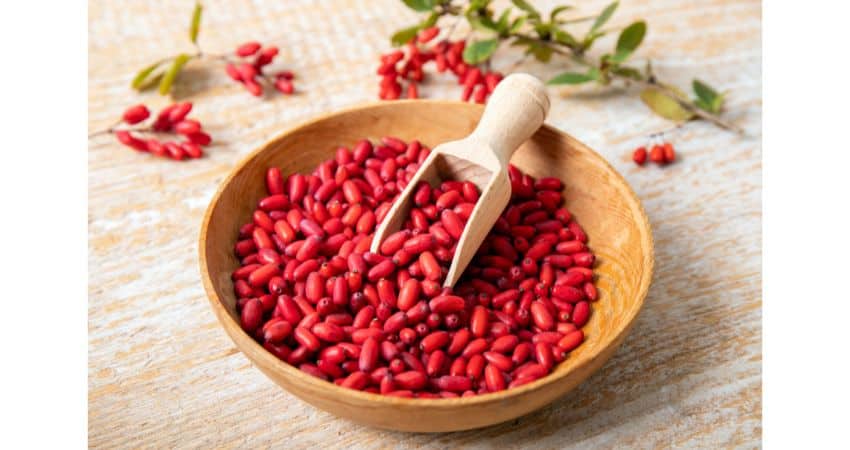5 Best Alternatives for Pomegranate in Salad
As a Certified Health Coach I’ve learned some people can’t eat pomegranate due to various reasons. The only solution is to get an alternative source of nutrients and flavor.
The best alternatives for pomegranate in salad include lemon, raspberries, cranberries, blackberries and dried barberries. Like pomegranate, these alternatives are tasty, have as much nutritional value as pomegranate seeds and are readily available.
This article will explore the fruits that could serve as the best replacements for pomegranate. In addition, learn about the health benefits and nutritional contents of these fruits, why you should add them to your next salad, and much more.
Alternatives for Pomegranate in Salad

Lemons
In case you don’t have pomegranate or simply can’t eat it for any reason, lemons could well be the missing component to a super tasty salad. The next time you make your vegetable salad or try a new salad recipe, don’t forget to add chopped lemons for enhanced flavor.
Lemons are rich in vitamin C, and they are known for their sour flavor and antioxidant properties. For ages, people have found uses for lemons in meat, cakes, drinks, and salads. What’s even better is how available lemons are. You can find a fresh batch anywhere in the market, local store, and the nearest fruit stand.
To get a better understanding of their nutritional value, here are a few health benefits of lemons in your salad1:
- Lemons contain a substantial amount of vitamin C, which is known to reduce the risk of heart diseases and stroke.
- Lemon contains pectin fiber, which helps in reducing weight. Pectin fiber limits your food intake by making you feel full. To get pectin fiber, eat whole lemons since lemon juice doesn’t have any. This way, you’ll reduce weight in a few weeks.
- Prevention of Anemia – Lemons have plenty of citric acids that help your body absorb iron from what you eat. Iron is a crucial component that helps in the formation of red blood cells.
- Prevention of Kidney Stones – Kidney stones occur when the body deposits minerals such as calcium in your ureters (located in the kidney). The citric acid in lemons helps in urine formation and also create an unsuitable environment for kidney stones.
Raspberries
Next time you make a cucumber, walnut, or spinach salad, adding a few raspberries would be a great idea. You can eat them whole or chop them into little slices. Since red raspberries are abundant, adding them to your salad will help resemble pomegranates, although the taste is different.
This wonderful fruit often comes in red, yellow, purple, or black color. No matter what color you choose, adding raspberries to your salad could add more nutritional value to your body.
Below are some health benefits of raspberries in your salad:
- Raspberries have plenty of vitamin B for energy, phosphorus, and magnesium for healthy bones and teeth.
- Vitamin C and antioxidants present in raspberries are essential in protecting your skin cells from damage, premature aging, and also fight cancer2.
- The red raspberries are packed with nutrients and vitamins such as vitamin A, riboflavin, fiber, and low-calorie content.
- Research reveals that raspberries have the phytochemicals required to ward off pathogens.
Raspberries bring out the taste in fruit and vegetable salads. They have several bioactive polyphenols, which aid in the fight against cardiovascular diseases3.
Cranberries
Cranberries are widely grown in North America. Over the years, they have grown into a popular fruit commonly used in casseroles, desserts, stuffing, and salad. Most people consume dried cranberries in juice or sauce form.
Here’s what you need to know about cranberries and why they should end up in your salad:
- Treatment of Urinary Tract Infections – Long ago, cranberries were used by Native Americans to treat urinary tract diseases and stomach discomfort. Today, taking cranberries is recommended in managing UTI. Regular intake could stop bacteria from infecting your urinary tract4.
- Prevention of Cardiovascular Illnesses – Adding some cranberries to your salad will be good for your heart. Recent research on the effects of cranberries on CVD revealed that taking cranberries improves lipoprotein synthesis and reduces blood pressure5.
- Preventing Cancer – The relationship between cranberries and cancer has been an exciting area of study as medical experts continue searching for a cure for cancer6.
Unless you can comfortably bear with the sharp, sour taste, don’t eat raw cranberries. Blend them or sprinkle on your salad to harvest the health benefits.
Blackberries
Blackberries are like an upgraded version of the raspberry. They have more nutrients meaning more nutritional values and a better reason to add them to your salad. Blackberries fit perfectly with any meal, dessert, and salad, and the benefits of blackberries are just as great as those of pomegranate7:
- Vitamin C – Blackberries have a high vitamin C content one serving of about 100gm (3.5 ounces) contains 35% of RDA of vitamin C. Vitamin C is good for the nervous system and protein synthesis.
- Vitamin A and K – If you’re always slow on healing small wounds, you need some vitamin K. Blackberries are a rich source of vitamin K, which aids in quick blood clotting. Vitamin A, on the other hand, is good for eyesight.
- Antioxidants – Aging is inevitable but can be slowed down with the help of antioxidants. These substances help repair damaged cells, and this could help slow down aging.
- Blackberries add life to your salad. All you need to do is add them to other fruits and greens, mix thoroughly, and there you have it! A delicious, nutritious salad.
Dried Barberries

Dried barberries have a similar taste to dried cranberries. Commonly found in Asia, particularly the Middle East, barberries are smaller than dried cranberries. Because of their size, they’re easier to sprinkle on all kinds of salad, rice, and meat cuisines, just like pomegranates.
The benefits of dried barberries include8:
- Digestive Disorders – For over two millennia, ancient doctors have used barberries to treat heart and digestive tract-related diseases.
- Acne Treatment
- Alkaloids such as berberine and chondocurine are the major bioactive phytochemicals in barberries. They have anti-inflammatory properties and help build immunity against bacterial and fungal diseases.
- Antioxidants – Barberries are rich in antioxidants that help reduce premature aging by repairing damaged cells.
- Anti-Cancer Properties – Due to high berberine content, barberries may trigger cancer cell death and inhibit cancer development9.
Your quinoa or bulgur salad would be incomplete without dried barberries. You can get them from an international market, Europe, or North Africa where they’re abundant. In a large bowl, add vegetables and sprinkle dried barberries. Mix with the ingredients and add other fruits to get a nutritious and tasty salad that will tantalize your taste buds.
If you have any questions to ask me about this article don’t hesitate to comment below or email us. You can find an email on our contact page.
Read Next
Is It Permissible To Substitute Fruit For Vegetables?
10 Best Alternatives for Avocado in Sushi
5 Best Alternatives for Spinach When Cooking
- National Center for Biotechnology Information: Citrus lemon (lemon) Phenomenon [↩]
- National Center for Biotechnology Information: Red raspberries have antioxidant effects that play a minor role in the killing of stomach and colon cancer cells [↩]
- National Center for Biotechnology Information: Red Raspberries and Their Bioactive Polyphenols: Cardiometabolic and Neuronal Health Links [↩]
- National Center for Biotechnology Information: Cranberries and lower urinary tract infection prevention [↩]
- National Center for Biotechnology Information: The effects of cranberry on cardiovascular metabolic risk factors [↩]
- National Center for Biotechnology Information: Cranberries and Cancer [↩]
- National center for Biotechnology Information: Rubus fruticosus (blackberry) use as an herbal medicine [↩]
- National Center for Biotechnology Information: Barberry in the treatment of obesity and metabolic syndrome: possible mechanisms of action [↩]
- National Center for Biotechnology Information: A systematic review of the anticancer properties of berberine, a natural product from Chinese herbs [↩]
